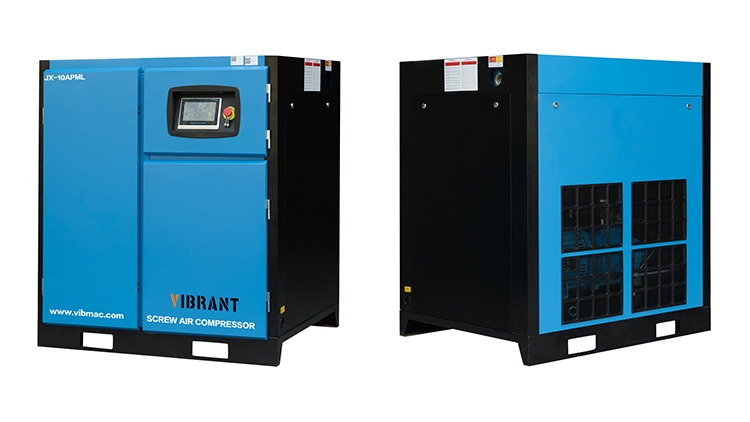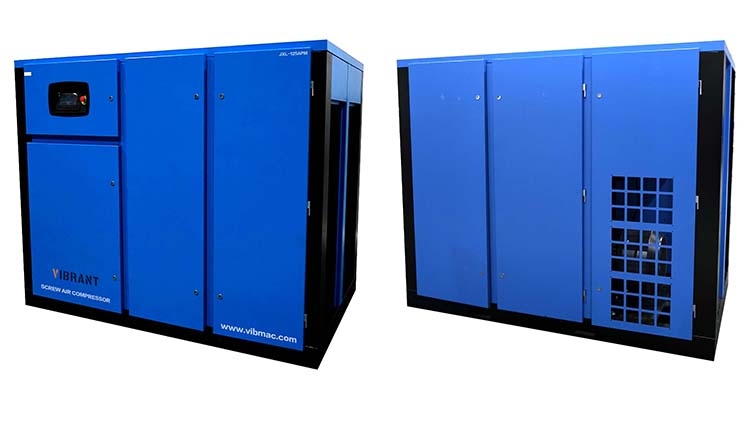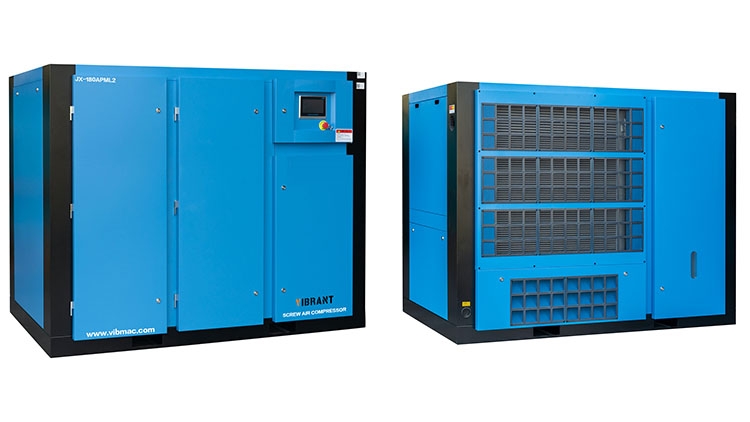
Common Failures of Screw Air Compressors and Their Maintenance Strategies in Refining and Chemical Plants
2024-03-28
The production process of refining and chemical industry involves complex chemical and physical change processes, including high temperature and high pressure environment, and refining and chemical production is a continuous production process, any one time the device stops and starts the operation, it significantly increases the production start-up and shutdown costs, which seriously affects the economic efficiency of the enterprise. Due to the complex structure and many sources of excitation of screw air compressors in refining and chemical plants, it is more difficult to diagnose their faults, and it is still in an exploratory and developmental stage, so it is very necessary to discuss the common faults of screw air compressors in refining and chemical plants and their maintenance strategies.
1. Analysis of common failures of screw air compressors in refining and chemical plants
The common failures of screw air compressors in refining and chemical plants can be divided into three major categories. One category is of fluid nature, belonging to the thermodynamic performance faults, mainly reflected when the air compressor is working with insufficient exhaust volume, exhaust pressure abnormalities, temperature abnormalities and so on; one category is mechanical in nature, belonging to the mechanical function failure, mainly characterized by abnormal sound, vibration and overheating when the air compressor is working, etc.; the other category is the electrical function failure, mainly characterized by blown fuses, faulty starter relays, too low voltage, etc..
The thermal performance of the compressor failure, electrical performance failures and mechanical failure are interlinked with mutual performance, it is very difficult to distinguish, and sometimes we need to make a detailed failure analysis in order to understand a particular failure state in-depth. Common typical faults, the cause of the analysis are shown in Table 1 below:
| Table 1 Common Faults of Screw Air Compressors | |
| Fault Situation | Causes |
| Unable to Start | Fuse blown, protective relay activated, start relay faulty, too low voltage, motor faulty, body faulty, phase failure 2 protective relay activated |
| High Running Current, Compressor Trips Automatically (Fault Light On) | Too low voltage, too high discharge pressure, incorrect lubricant specification, clogged oil-air separator core, air end fault |
| High Oil Content in Air, Shortened Lubricating Oil Adding Cycle | Too high oil level, clogged returning throttle hole or filter, destruction of oil/air separator core, spring fatigue of minimum pressure valve. |
| High Temperature of the Exhaust, Compressor Protection Shutdown | Insufficient lubricant quantity, high ambient temperature, clogged oil cooler, incorrect lubricant specification, clogged oil filter |
| Unable to Run under Load | Solenoid valve failure, poor operation of unloading valve, poor operation of the minimum pressure valve, leakage of the control pipeline, pressure valve spool jammed and can not be reset |
Above only listed the daily appearance of more faults, in the petrochemical enterprises, high oil temperature of refining equipment and caused by the shutdown is one of the most common and easy to cause serious consequences of the screw air compressor failure, the most common reasons for high oil temperature is usually low lubricating oil or oil poor quality, the heat of the valve spool is damaged, the efficiency of the heat exchange is reduced, the ambient temperature and so on can also cause the oil temperature of the locomotive too high. In general, to determine the quality of the oil, you can observe the color, according to the situation to add the appropriate amount of lubricant or replace all the lubricant.
2. Common failure maintenance strategies for screw compressors in refining and chemical plants
2.1 Maintenance strategy using the reliability approach
As time passes, the amount of damage to the screw compressor increases, especially when it reaches the period of severe wear and tear, the amount of damage to the screw compressor increases dramatically, and the reliability is decreasing. However, by comparing the second new compressor and the new compressor in a certain same period of time, the damage of the new compressor is relatively less, so the reliability of the new compressor is still relatively high. Therefore, when analyzing the reliability, it is necessary to consider the reliability of the compressor’s service life, and develop corresponding maintenance strategies for screw compressors of different ages. To meet the actual requirements, so as to achieve a high level at a lower cost to ensure that the reliability of the level.
2.2 Maintenance strategies with a preventive approach
According to the past experience and the actual operation status, the failure of screw air compressor with the highest incidence is the unit noise, high oil temperature, insufficient air supply, etc., which reminds the maintenance technicians in the screw air compressor maintenance work, we should focus on the prevention of these kinds of failures. On the basis of understanding the principle of fault, use reliability analysis to guide the maintenance of screw air compressors, so as to achieve the best combination of reliability and economy. For example, use testing equipment, on the basis of disassembling screw compressors, directly test the sub-new screw compressors for safety and reliability performance, and assess their reliability performance. If a screw compressor reaches failure requirements or is about to fail, the screw compressor should be removed and replaced. If the reliability requirements are met, they may be allowed to continue to operate.
This avoids the phenomena of “under-maintenance” and “over-maintenance”. Thus also avoid the early failure of the screw compressor due to excessive disassembly, but also to avoid the human factor in the maintenance process of the screw pump such as precision components caused by the potential for failure, and greatly reduces the maintenance time.
2.3 Different maintenance strategies for different faults: Chemical Plants
(1) Vibration repair strategy. The vibration faults of the screw compressor include rotor imbalance, rotor misalignment, oil film vortexing, gear failure, and friction between the rotor and stationary parts. When the rotor is unbalanced we can take: dynamic balancing of the rotor; installing parts in a symmetrical position; rotor descaling, repair; eliminating loose parts; replacing damaged parts and removing stress.
(2) Maintenance strategy for temperature signal troubleshooting. The temperature signal is a slowly changing signal, and it is generally analyzed by time domain analysis. Air compressor bearing wear, abnormal working conditions and other phenomena can be reflected by changes in the temperature signal. The temperature of the air compressor is collected through the temperature inspection instrument, and the upper and lower alarm limits are generally set for the temperature signal. When the alarm occurs, it is necessary to check and analyze the working and wear conditions of the air compressor accordingly; when the air compressor is started, the overall temperature is on the low side, and after running, the temperature gradually rises, and finally stabilizes within a specific temperature range.
2.4 Maintenance strategies for active promotion of state
Since understanding condition-based maintenance systems requires expertise in a variety of areas, such as mechanical vibration theory, fluid analysis theory, signal processing, fault diagnosis, artificial intelligence, and other fields, we should actively advocate aspects of fault diagnosis and maintenance strategies.
(1) In order to realize the detection of transient, non-stationary or sudden changes in the operating status of equipment, and to make quick and accurate monitoring and prediction of abnormal precursors, we should develop a targeted microcomputer control processing system with self-learning functions and related information processing functions.
(2) Due to the strong field interference signals, harsh operating environment, the sensor will inevitably fail, and the resulting false alarms will affect the reliability of the system and the degree of trust, so in how to eliminate false alarms to improve the reliability of the system needs to be continually explored.
3. Conclusion
Screw air compressor is one of the main equipments commonly used in the production of refining equipment in petrochemical enterprises, due to the long operation time, harsh working environment, etc., it is inevitable that there will be a variety of faults and hidden dangers of screw air compressors. Therefore, it is very necessary to monitor and warn the operation status of screw air compressors. At the same time, in order to improve the availability of equipment, reduce operating costs, minimize downtime and avoid waste of resources, it is necessary to carry out accurate diagnosis of screw air compressor failures, so as to carry out timely and efficient maintenance. Check here.








